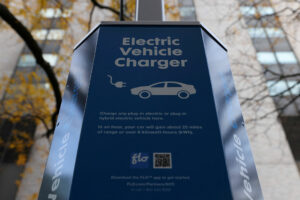A PROPOSED executive order (EO) on the Electric Vehicle (EV) Incentive Strategy will likely be endorsed to the office of President Ferdinand R. Marcos, Jr. by the end of the year, an Energy department official said.
“We are still hopeful that it (the EO) comes out. So, definitely in next year’s Comprehensive Roadmap for the EV Industry (CREVI), the EV Incentive Strategy will be in place,” Patrick T. Aquino, director of the Energy Utilization Management Bureau at the Department of Energy (DoE), said on the sidelines of the pre-event conference of the 12th Philippine Electric Vehicle Summit (PEVS).
The proposed EV Incentive Strategy is expected to result in the manufacture of around four million EVs in the country in the next 10 years.
The strategy involves fiscal and non-fiscal incentives for consumers such as purchase subsidies in the form of direct financial rebates or discounts, tax credits, value-added tax exemption or reduction, and fuel cost savings through special electricity rates for EV charging.
It also proposes incentives for homeowners who will install EV charging infrastructure at their residences, as well as trade-in bonuses for vehicle owners. Also proposed are rental subsidies for consumers who rent EVs.
Mr. Aquino said the strategy is important to ensure the country can attract more EV manufacturers.
“There are no additional players, which is why it is very important for us to come out and craft the EV Incentive Strategy… which will be a Comprehensive Automotive Resurgence Strategy (CARS)-like program, which is why it will also be supported by funding,” he said.
“Similar to CARS, at certain volumes, they will get some assistance, so that is what we can expect from there,” he added.
Mr. Aquino said the program may possibly cover two- or three-wheelers and special-purpose vehicles, which are the platform types that can be used as jeepneys or ambulances.
“I think for the commercial and the passenger-type, we have missed the boat already,” he added.
The Department of Trade and Industry (DTI) is set to do consultations for the draft EO for the EVIS this month or in October.
Mr. Aquino said they will make sure the EVIS will avoid the “pitfalls” seen in the CARS program. In terms of threshold, he said the EVIS have lower requirements compared to the CARS program.
Meanwhile, Mr. Aquino said that the DoE is also set to release the updated CREVI within the month.
“I think it’s going to be just touch-ups reflecting the developments that we’ve had since 2023 and then what we’re seeing right now,” he added.
EV ADOPTION
Adoption of EVs in the country is on track to hit targets, Mr. Aquino said.
“When we started off with the passage of the law, there’s just literally a handful of EVs that you can purchase. Now, there’s a lot of new vehicles coming in the market,” he said.
The government’s decision to expand the coverage of Executive Order No. 12 to include tax breaks for electric motorcycles (e-motorcycles), electric bicycles (e-bicycles) and hybrid EVs is driving the industry’s growth.
“The Filipino consumer now has more options to electrify. When I say electrify, it covers pure battery EVs, plug-in hybrids, hybrid EVs, and light EVs. So, there’s more options for the consumers,” he said.
To further drive adoption, he said the DoE is also looking at mandating gasoline stations to put up charging stations.
“As you see, in terms of either sales or registrations, we’ve not yet reached a critical mass… so we have to also be mindful of the business implications of a mandate,” he added.
Under the Electric Vehicle Industry Development Act (EVIDA), gas stations that will not put up charging stations may face penalties and fines.
Asked about providing more incentives for consumers, he said prices of EVs have actually gone down so there is no need to implement such incentives.
“I think if you take a look at the cost of the vehicles right now, it has gone down substantially. In fact, because of the cost, the government might start requiring pure EV purchases starting in 2026,” he said.
“Essentially, we’ll just require everybody to go buy electric, whether it’s hybrid EVs, plug-in hybrid EVs, or battery EVs,” he added.
According to the Electric Vehicle Association of the Philippines (EVAP), sales of battery EVs reached 811 in the first four months, while sales of hybrid EVs and plug-in hybrid EVs were at 248 and 13, respectively.
Meanwhile, EV sales last year totaled 1,359 for battery EVs and 6,156 for hybrid EVs.
EVAP President Edmund A. Araga said that he is banking on the 12th PEVS, which will be held from Oct. 24 to 26, to spur further adoption of EVs.
“The 12th PEVS is designed to further ignite a powerful call to action for a transformative shift in transportation and mobility,” he said. — Justine Irish D. Tabile

